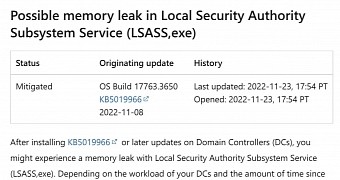Microsoft has recently confirmed a new problem caused by the updates it released in the past, with the company explaining that IT admins could notice a memory leak on Domain Controllers.
The whole thing is being caused by update KB5019966, which was released on November 8 as part of this month’s Patch Tuesday update.
Needless to say, only Windows Server systems are affected, including the following:
- Windows Server 2019
- Windows Server 2016
- Windows Server 2012 R2
- Windows Server 2012
- Windows Server 2008 R2 SP1
- Windows Server 2008 SP2
The client versions of Windows are not impacted.
“After installing KB5019966 or later updates on Domain Controllers (DCs), you might experience a memory leak with Local Security Authority Subsystem Service (LSASS,exe). Depending on the workload of your DCs and the amount of time since the last restart of the server, LSASS might continually increase memory usage with the up time of your server and the server might become unresponsive or automatically restart. Note: The out-of-band updates for DCs released November 17, 2022 and November 18, 2022 might be affected by this issue,” Microsoft explains.
The Redmond-based software giant says it’s already working on a fix, and it will be included in an upcoming update. No information on its ETA has been shared though.
In the meantime, however, IT admins can turn to a simple workaround to resolve the glitch. The company recommends everyone to launch a Command Prompt window with administrator privileges and run the following command to set the registry key called KrbtgtFullPacSignature and therefore stop the memory leak:
reg add "HKLM\System\CurrentControlSet\services\KDC" -v "KrbtgtFullPacSignature" -d 0 -t REG_DWORD
“Once this known issue is resolved, you should set KrbtgtFullPacSignature to a higher setting depending on what your environment will allow. It is recommended to enable Enforcement mode as soon as your environment is ready,” Microsoft notes.

 14 DAY TRIAL //
14 DAY TRIAL //